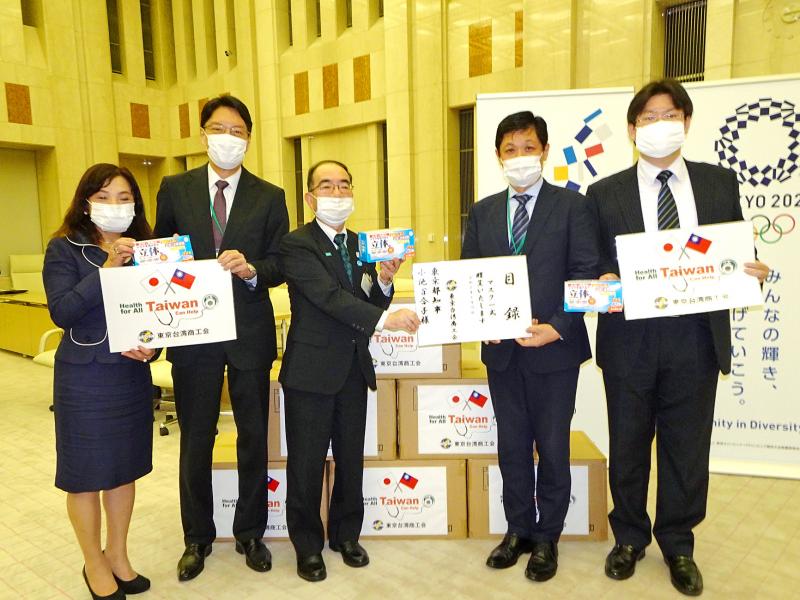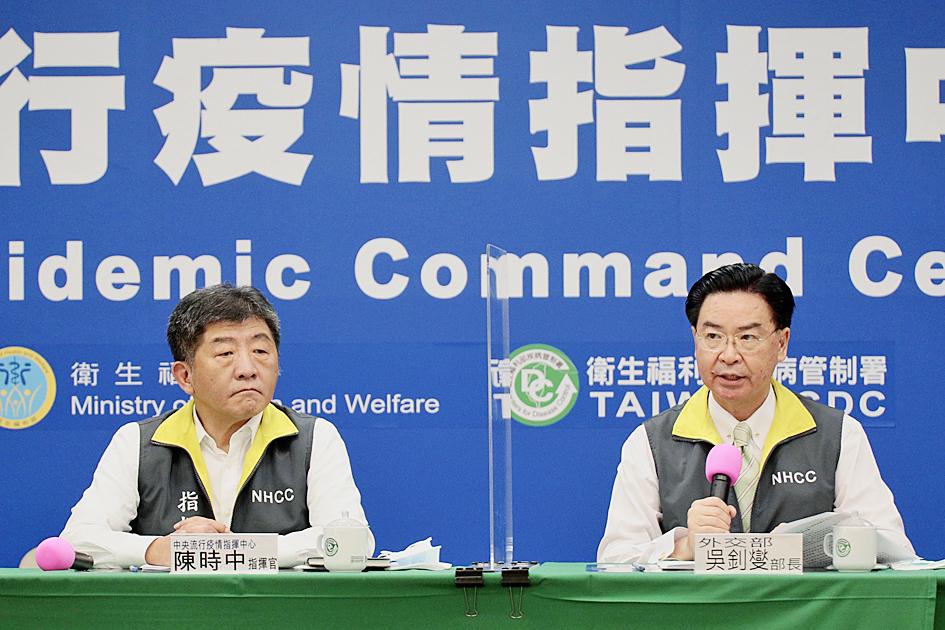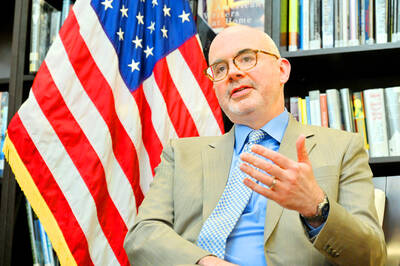Taiwan deeply regrets and is very dissatisfied that it was not invited to attend the annual World Health Assembly (WHA), which began a virtual meeting yesterday, Minister of Health and Welfare Chen Shih-chung (陳時中) and Minister of Foreign Affairs Joseph Wu (吳釗燮) said.
During the Central Epidemic Command Center’s daily news conference, Chen, who heads the center, said that as of 2pm, Taiwan had not received an invitation to the meeting, which was to begin at 6pm Taiwan time.
“We put in our efforts [to get invited] up until the last moment, but it seems that we are unlikely to be invited, so we want to express our regret and dissatisfaction for the situation, as well as protest against it,” he said.

Photo: CNA
He said a letter of protest was sent yesterday the WHO Secretariat, which is headquartered in Geneva, Switzerland.
While the focus of this year’s WHA should be on the COVID-19 pandemic, Taiwan’s performance in fighting the coronavirus is worth sharing with other nations, so Taiwan’s exclusion from the meeting is a loss for the WHO, as well as harmful to Taiwan, as it cannot learn from WHO members’ experiences, Chen said.
“We hope the WHO can remain professional and politically neutral, refuse political interference and not neglect the right to health for any area or anyone in the world, as it should be equal to all,” he said.

Photo: AFP / Central Epidemic Control Center handout
Wu said 29 nations had expressed support for Taiwan’s WHO participation, all of its diplomatic allies submitted a proposal to the WHO for Taiwan to be invited, and a growing number of world leaders have spoken out publicly for Taiwan.
Prominent political figures from 43 nations, including more than 600 legislators, have expressed support for Taiwan’s WHO campaign, and an unprecedented outpouring of support for Taiwan’s WHO participation has been seen in international media reports, commentaries, letters to the editor and editorials, he added.
“Our actions speak for themselves — Taiwan can help, and Taiwan is helping,” Wu said.
Taiwan’s hospitals have shared their experience in fighting COVID-19 with other nations through videoconferences, and the government is working closely with the US and European countries to develop rapid testing kits, vaccines and medicine, he added.
Taiwan has donated 27.5 million masks, 131 infrared thermal imaging cameras, 35,000 forehead thermometers and 250 automatic body temperature detection systems to countries in need, helping more than 80 countries, Wu said.
It is preparing to donate 23.5 million more masks, 1.16 million N95 masks, 170,000 protective gowns, 600,000 isolation-unit gowns, 70 respirators and 500,000 quinine tablets, he said.
“The Chinese government claims it takes care of the health of Taiwanese, but has deprived the people of Taiwan time and time again, which will only increase Taiwanese antipathy to it,” he said. “They will not give up the collective wish to increase international participation and contribute to the world.”
“The UN General Assembly Resolution 2758 or the WHA Resolution 25.1 did not mention Taiwan, nor authorize the People’s Republic of China to represent Taiwan,” he said. “Taiwan is a democratic country and only the Taiwanese government elected by the people can represent them to take part in international organizations.”
Wu urged the WHO Secretariat to listen carefully to reasonable appeals from the international community, resist interference by the Chinese government and allow Taiwan to take part in all WHO meetings, mechanisms and activities.
The Chinese Nationalist Party (KMT) also expressed regret yesterday that Taiwan was not invited to this year’s WHA.
Taiwan’s COVID-19 response has been above average, and if the nation could become a WHO member, it would be able to share its experience with other nations more quickly, the party said.
Beijing should not ignore the right to health of Taiwanese because of differences in political opinions with the Democratic Progressive Party (DPP), it said.
While it expressed its gratitude to the nation’s allies who submitted a proposal for Taiwan’s meaningful participation in the WHA, as well as the ones who voiced verbal support, the KMT called on the DPP government to assess the effectiveness of its “mask diplomacy” and New Southbound Policy, and to “explain why most recipient countries or target countries have not provided practical support for [Taiwan’s] participation.”
Additional reporting by Sherry Hsiao and CNA

NATIONAL SECURITY: The Chinese influencer shared multiple videos on social media in which she claimed Taiwan is a part of China and supported its annexation Freedom of speech does not allow comments by Chinese residents in Taiwan that compromise national security or social stability, the nation’s top officials said yesterday, after the National Immigration Agency (NIA) revoked the residency permit of a Chinese influencer who published videos advocating China annexing Taiwan by force. Taiwan welcomes all foreigners to settle here and make families so long as they “love the land and people of Taiwan,” Premier Cho Jung-tai (卓榮泰) told lawmakers during a plenary session at the Legislative Yuan in Taipei. The public power of the government must be asserted when necessary and the Ministry of

CROSSED A LINE: While entertainers working in China have made pro-China statements before, this time it seriously affected the nation’s security and interests, a source said The Mainland Affairs Council (MAC) late on Saturday night condemned the comments of Taiwanese entertainers who reposted Chinese statements denigrating Taiwan’s sovereignty. The nation’s cross-strait affairs authority issued the statement after several Taiwanese entertainers, including Patty Hou (侯佩岑), Ouyang Nana (歐陽娜娜) and Michelle Chen (陳妍希), on Friday and Saturday shared on their respective Sina Weibo (微博) accounts a post by state broadcaster China Central Television. The post showed an image of a map of Taiwan along with the five stars of the Chinese flag, and the message: “Taiwan is never a country. It never was and never will be.” The post followed remarks

Proposed amendments would forbid the use of all personal electronic devices during school hours in high schools and below, starting from the next school year in August, the Ministry of Education said on Monday. The Regulations on the Use of Mobile Devices at Educational Facilities up to High Schools (高級中等以下學校校園行動載具使用原則) state that mobile devices — defined as mobile phones, laptops, tablets, smartwatches or other wearables — should be turned off at school. The changes would stipulate that use of such devices during class is forbidden, and the devices should be handed to a teacher or the school for safekeeping. The amendments also say

CONSISTENT COMMITMENT: The American Institute in Taiwan director said that the US would expand investment and trade relationships to make both nations more prosperous The US would not abandon its commitment to Taiwan, and would make Taiwan safer, stronger and more prosperous, American Institute in Taiwan Director Raymond Greene said. “The US’ commitment to Taiwan has been consistent over many administrations and over many years, and we will not abandon our commitment to Taiwan, including our opposition to any attempt to use force or coercion to change Taiwan’s status,” he said in an exclusive interview with the Liberty Times (the sister newspaper of the Taipei Times) on Friday last week, which was published in the Chinese-language newspaper yesterday. The US would double down on its efforts